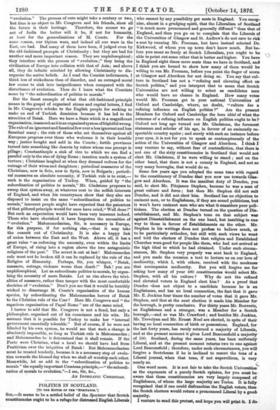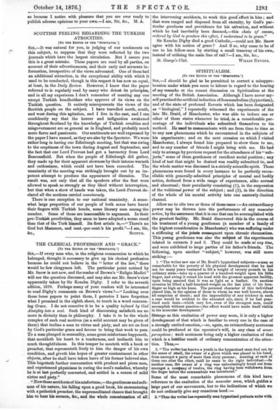POLITICS IN SCOTLAND
[TO THE EDITOR OF THE "SPZ4TFATOR.1
SIR,—It seems to be a settled belief of the Spectator that Scotch constituencies ought to be a refuge for distressed English Liberals who cannot by any possibility get seats in England. You recog- nise, almost in a grudging spirit, that the Liberalism of Scotland "is much more pronounced and generally diffused" than that of England, and then you go on to complain that the Liberals of the Universities of Glasgow and St. Andrew's do not care to risk a seat by running Mr. Freeman, but have instead selected Dr. Kirkwood, of whom you up town don't know much. But be- fore you sneer so freely at Scotch Liberalism, you ought to be able to point out some other that is better and higher. You have in England eight times more seats than we have in Scotland, and I think you are bound to show how many of them would be willing to run Mr. Freeman, before you point the finger of scorn at Glasgow and Aberdeen for not doing so. You say that cul- ture in Scotland has not a "refining and elevating effect on Scotch politics," and you interpret that to mean that Scotch Universities are not willing to select as candidates men who would have no chance in England. How many votes would Mr. Freeman get in your national Universities of Oxford and Cambridge, where, no doubt, "culture has a refining influence on English politics ?" Are the present Members for Oxford and Cambridge the beau ideal of what the outcome of a refining influence on English politics ought to be? Oxford not long ago turned out Mr. Gladstone, the foremost statesman and scholar of his age, in favour of an eminently re- spectable country squire ; and surely with such an instance before your eyes, it is not for you to speak so contemptuously of the action of the Universities of Glasgow and Aberdeen. I think I may venture to say, without fear of contradiction, that there is- not one of the sixty constituencies in Scotland that would not elect Mr. Gladstone, if he were willing to stand ; and on the other hand, that there is not a county in England, and not so very many boroughs, that would do so.
Some few years ago you adopted the same tone with regard to the constituency of Dundee that you now use towards Glas- gow and Aberdeen. It was the manifest duty of Dundee, you said, to elect Mr. Fitzjames Stephen, because he was a man of great culture and force ; but then Mr. Stephen did not suit Dundee, and it did not elect him. Scotland has no objection to eminent men, or to Englishmen, if they are sound politicians, but it won't have eminent men who are what it considers poor poli- ticians. The election at Dundee turned on the question of Die- establishment, and Mr. Stephen's tone on that subject was against Disestablishment on the one hand, but insulting in one to those in favour of Establishments on the other. Mr. Stephen in his writings does not profess to believe much, or to be particularly orthodox, but still with such views he went and told the electors of Dundee that religion and Established Churches were good for people like them, who had not arrived at the high ideal to which he had obtained. Under such circum- stances, Mr. Stephen very properly was sent back to England, and you made the occasion a text to lecture us on our love of mediocrity, which I, with others, received with the meekness that accompanies mediocrity. But you will forgive me for- saking how many of your 480 constituencies Would select Mr.
Stephen, with all his culture ? Why do not the refined and elevated voters in England elect him ? As a proof that Dundee -does not object to a candidate because he is an Englishman, and has no local connection, the fact that it gave Mr. E. Jenkins four times the number of votes that it gave Mr. Stephen, and that at the next election it made him Member for- the borough, is pretty conclusive. For thirty years Mr. Bouverie, an Englishman and a stranger, was a Member for a Scotclr borough,—and so was Mr. Crawford ; and besides Mr. Jenkins, Mr. Trevelyan and Mr. Ernest Noel are elected, in spite of their- having no local connection of birth or possessions. England, for- the last forty years, has rarely returned a majority of Liberals, and at the present moment it gives Lord Beaconsfield a majority of 100. Scotland, during the same years, has been uniformly Liberal, and at the present moment returns two to one against Lord Beaconsfield ; therefore, under such circumstances, you will forgive a Scotchman if he is inclined to resent the tone of a Liberal journal, when that tone, if not supercilious, is very- nearly so.
One word more. It is not fair to take the Scotch Universitie9 as the exponents of a purely Scotch opinion, for you must be- aware that these constituencies are very largely composed of Englishmen, of whom the large majority are Tories. It is fully' recognised that if one could disfranchise the English voters, then the Scotch electors would return a pronounced Liberal by a good majority.
I venture to send this protest, and hope you will print it I do.



































 Previous page
Previous page